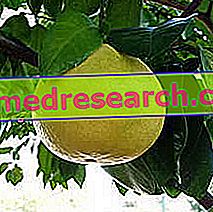
Scientific name
Citrus paradisi
Family
Rutaceae
Origin
Far East
Used Parts
The drug is given by the juice obtained by squeezing the fruit
Chemical constituents
- Vitamins;
- Flavonoids (naringin, naringenin, hesperidin);
- Minerals;
- Cumarine.
Grapefruit in Herbal Medicine: Properties of Grapefruit
Grapefruit is a fruit used much more frequently in the food sector than in the phytotherapeutic field.
A particular note can be made to naringin : in fact this substance has an action on the liver, inhibiting some enzymes responsible for the transformation of drugs and food.
Biological activity
The use of grapefruit has not obtained official approval for any type of therapeutic application, although in the market you can find numerous supplements based on grapefruit seeds that boast the alleged antibacterial and antioxidant activities. These properties would be ascribed to the flavonoids contained in the plant.
Some studies conducted in vitro have investigated the antibacterial activity of ethanol extracts of grapefruit seeds reaching the conclusion that, in effect, they are able to exert a bactericidal action - both against Gram-positive and Gram-negative bacteria - through a mechanism that involves the destruction of the bacterial cell membrane with consequent leakage of the cytoplasmic content and death of the bacterial cell.
Conversely, other studies claim that grapefruit seeds do not possess any kind of antibacterial activity per se, but that the broad-spectrum antimicrobial action observed in the various studies conducted is due to the presence of ethyl alcohol in the hydroalcoholic extracts and / or to the addition of synthetic preservative and / or antimicrobial agents to these same extracts.
Therefore, the real antibacterial efficacy that many people attribute to grapefruit seeds has not yet been proven beyond a reasonable doubt (for more information about the properties of grapefruit seed extract, we recommend reading the article dedicated "Grapefruit Seeds, Grapefruit Seed Extract ").
Grapefruit, in reality, is rather well known in the medical field not so much for its supposed therapeutic properties, but for the pharmacological interactions it can give rise to.
The naringin contained in it, in fact, is able to inhibit the cytochrome P450 present in the liver (including the isoforms CYP3A4 and CYP1A2) and this can cause an alteration of the metabolism of drugs taken together, with very serious consequences. But that is not all. In fact, it seems that naringin and other flavonoids present in grapefruit are also able to interfere with the intestinal absorption of some active ingredients, thus causing a decrease or increase in the plasma concentration of these same drugs.
The ability of the grapefruit and the flavonoids contained in it to inhibit hepatic microsomal systems has been widely confirmed by multiple studies, so much so that within the illustrative leaflet of numerous medicinal products there is reported the precise indication of not taking the drug concomitantly with grapefruit or its derivatives (including juice).
However, several studies have been conducted on naringin also to investigate potential potential therapeutic properties.
One of these studies in animals showed that naringin can improve ketoacidosis and oxidative stress associated with type 1 diabetes.
Other research conducted both in vitro and in vivo, however, showed that naringin can suppress the growth of malignant cells belonging to different types of cancer. While another study has shown how this flavonoid may be able to improve memory deficits that characterize Alzheimer's disease.
However, before approving any kind of naringin therapeutic application contained in grapefruit, further and more in-depth studies are needed.
Grapefruit in folk medicine
In addition to using its juice for its refreshing properties and as a rich source of vitamins in the event of convalescence, folk medicine uses grapefruit to treat gastrointestinal disorders, digestive disorders, flu and colds. In addition, traditional medicine also uses this plant as a diuretic, disinfectant, purifying, detoxifying and slimming remedy.
As far as homeopathic medicine is concerned, however, for the moment grapefruit does not find significant uses in this area.
Side effects
Nausea and vomiting may occur at high doses.
Contraindications
Avoid taking in case of hypersensitivity to one or more components.
Pharmacological Interactions
- the fruit juice increases the bioavailability of nifedipine, verapamil and nimodipine, and acts as an enzyme inhibitor by interfering with the metabolism of some important drugs (calcium antagonists, dicumarols, benzodiazepines, estroprogestinici, terfenadine, cyclosporine).



